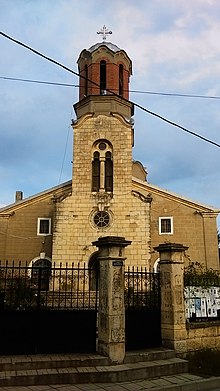Razgrad
Razgrad (Bulgarian: Разград [ˈrazɡrat]) is a city in Northeastern Bulgaria in the valley of the Beli Lom river that falls within the historical and geographical region of Ludogorie (Deliorman).
Razgrad was built upon the ruins of the Ancient Roman town of Abritus on the banks of the Beli Lom river.
Several bronze coins of the Thracian king Seuthes III (330-300 BC) and pottery were found, as well as artifacts from other rulers and a sacrificial altar of Hercules.
In 251, the town was the site of the Battle of Abrittus, during which the Goths defeated a Roman army under the emperors Trajan Decius and Herennius Etruscus.
Some of Razgrad's landmarks include the Varosha architectural complex from the 19th century, the ethnographic museum and several other museums, the distinctive Razgrad clock tower in the centre built in 1864, the St Nicholas the Miracle Worker Church from 1860, the Momina cheshma sculpture, the Mausoleum Ossuary of the Liberators (1879–1880) and the Ibrahim Pasha Mosque from 1530.





